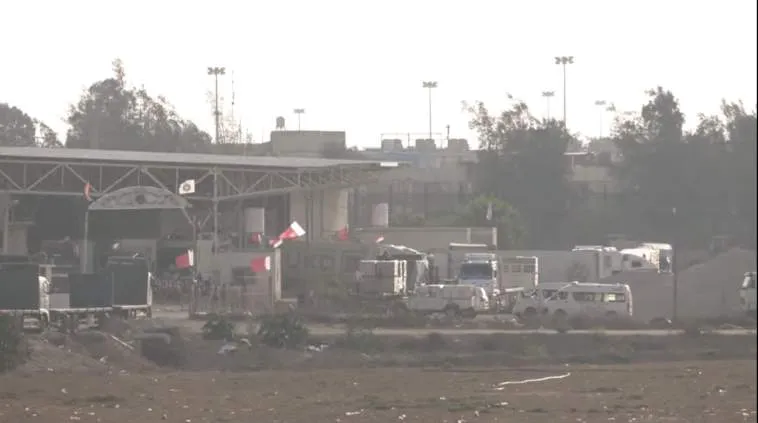(The Exposé) In response to the desperate situation of Palestinians in Gaza due to Israel’s ongoing retaliation for the October 7th attack by Hamas, neighboring countries, Egypt and Jordan, have firmly rejected providing refuge. Jordan has a significant Palestinian population, but together with Egypt, they have refused to take in Palestinian refugees from Gaza and the occupied West Bank.
Egyptian President Abdel Fattah el-Sissi, in particular, expressed concern that the ongoing conflict was not solely about fighting Hamas but also an attempt to force the civilian population to migrate to Egypt, which he warned could jeopardize peace in the region.
This information was originally published in the Associated Press, authors Jack Jeffery and Samy Magdy explain;
Why Egypt and other Arab countries are unwilling to take in Palestinian refugees from Gaza
As desperate Palestinians in sealed-off Gaza try to find refuge under Israel’s relentless bombardment in retaliation for Hamas’ brutal Oct. 7 attack, some ask why neighboring Egypt and Jordan don’t take them in.
The two countries, which flank Israel on opposite sides and share borders with Gaza and the occupied West Bank, respectively, have replied with a staunch refusal. Jordan already has a large Palestinian population.
Egyptian President Abdel Fattah el-Sissi made his toughest remarks yet on Wednesday, saying the current war was not just aimed at fighting Hamas, which rules the Gaza Strip, “but also an attempt to push the civilian inhabitants to … migrate to Egypt.” He warned this could wreck peace in the region.


Jordan’s King Abdullah II gave a similar message a day earlier, saying, “No refugees in Jordan, no refugees in Egypt.”


Their refusal is rooted in fear that Israel wants to force a permanent expulsion of Palestinians into their countries and nullify Palestinian demands for statehood. El-Sissi also said a mass exodus would risk bringing militants into Egypt’s Sinai Peninsula, from where they might launch attacks on Israel, endangering the two countries’ 40-year-old peace treaty.
Here is a look at what is motivating Egypt’s and Jordan’s stances.
A HISTORY OF DISPLACEMENT
Displacement has been a major theme of Palestinian history. In the 1948 war around Israel’s creation, an estimated 700,000 Palestinians were expelled or fled from what is now Israel. Palestinians refer to the event as the Nakba, Arabic for “catastrophe.”
In the 1967 Mideast war, when Israel seized the West Bank and Gaza Strip, 300,000 more Palestinians fled, mostly into Jordan.


The refugees and their descendants now number nearly 6 million, most living in camps and communities in the West Bank, Gaza, Lebanon, Syria and Jordan. The diaspora has spread further, with many refugees building lives in Gulf Arab countries or the West.
After fighting stopped in the 1948 war, Israel refused to allow refugees to return to their homes. Since then, Israel has rejected Palestinian demands for a return of refugees as part of a peace deal, arguing that it would threaten the country’s Jewish majority.
Egypt fears history will repeat itself and a large Palestinian refugee population from Gaza will end up staying for good.


NO GUARANTEE OF RETURN
That’s in part because there’s no clear scenario for how this war will end.
Israel says it intends to destroy Hamas for its bloody rampage in its southern towns. But it has given no indication of what might happen afterward and who would govern Gaza. That has raised concerns that it will reoccupy the territory for a period, fueling further conflict.
The Israeli military said Palestinians who followed its order to flee northern Gaza to the strip’s southern half would be allowed back to their homes after the war ends.


Egypt is not reassured.
El-Sissi said fighting could last for years if Israel argues it hasn’t sufficiently crushed militants. He proposed that Israel house Palestinians in its Negev Desert, which neighbors the Gaza Strip, until it ends its military operations.
“Israel’s lack of clarity regarding its intentions in Gaza and the evacuation of the population is in itself problematic,” said Riccardo Fabiani, Crisis Group International’s North Africa Project Director. “This confusion fuels fears in the neighborhood.”
Egypt has pushed for Israel to allow humanitarian aid into Gaza, and Israel said Wednesday that it would, though it didn’t say when. According to United Nations, Egypt, which is dealing with a spiraling economic crisis, already hosts some 9 million refugees and migrants, including roughly 300,000 Sudanese who arrived this year after fleeing their country’s war.
But Arab countries and many Palestinians also suspect Israel might use this opportunity to force permanent demographic changes to wreck Palestinian demands for statehood in Gaza, the West Bank and east Jerusalem, which was also captured by Israel in 1967.
El-Sissi repeated warnings Wednesday that an exodus from Gaza was intended to “eliminate the Palestinian cause … the most important cause of our region.” He argued that if a demilitarized Palestinian state had been created long ago in negotiations, there would not be war now.
“All historical precedent points to the fact that when Palestinians are forced to leave Palestinian territory, they are not allowed to return back,” said H.A. Hellyer, a senior associate fellow at the Carnegie Endowment for International Peace. “Egypt doesn’t want to be complicit in ethnic cleansing in Gaza.”
Arab countries’ fears have only been stoked by the rise under Israeli Prime Minister Benjamin Netanyahu of hard-right parties that talk in positive terms about removing Palestinians. Since the Hamas attack, the rhetoric has become less restrained, with some right-wing politicians and media commentators calling for the military to raze Gaza and drive out its inhabitants. One lawmaker said Israel should carry out a “new Nakba” on Gaza.








